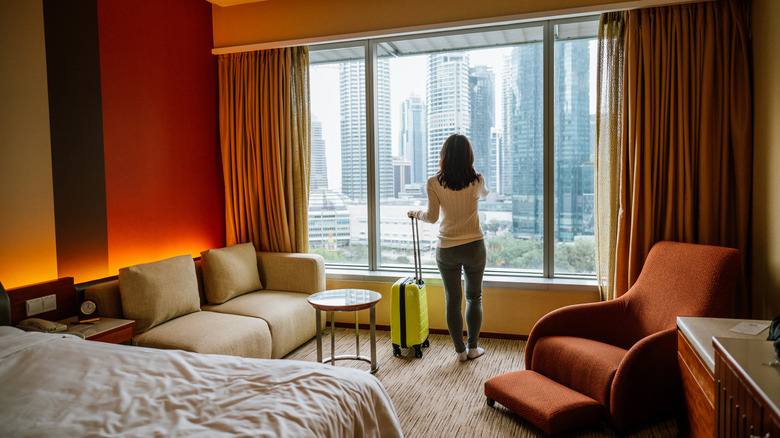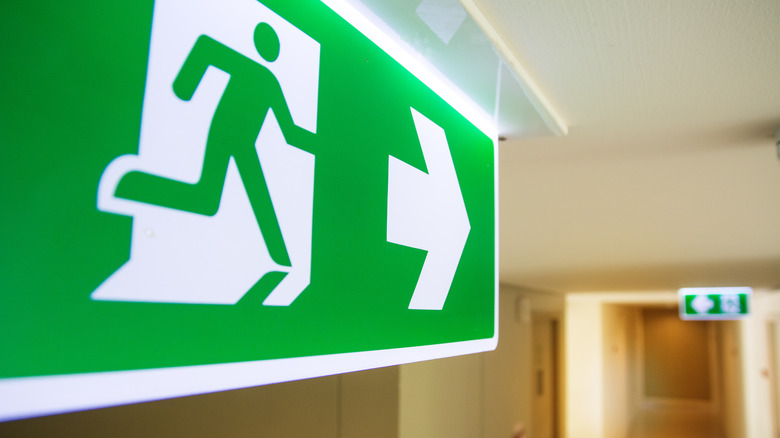A Travel Safety Expert Tells Us Which Floor To Avoid When Staying At A Hotel
Your hotel room can feel like a safe haven after a day of sightseeing and exploring a foreign city. But, unfortunately, things can go wrong in hotels just as they can anywhere else. A fire could break out in the restaurant, a natural disaster could occur while you are on vacation, or an intruder could force their way in your door.
Staying vigilant and following the hotel's instructions is one way to stay safe should an emergency occur, but preventative measures can also help you protect yourself from unexpected dangers. Explore spoke exclusively with Joanne McNellis, founder of Travel Safety Solutions, about the safety considerations travelers should keep in mind when booking a hotel room. According to the expert, some floors could put you more at risk than others. "As a rule of thumb, staying in a first-floor room is not recommended," McNellis revealed. "Higher traffic on the first or ground level floors, easier guest access, and proximity to parking lots generally make them less safe than higher floors."
The safety professional suggests requesting a room above the fifth floor to avoid run-ins with criminals. However, she also has a few warnings about top floors to be aware of before your next trip.
If you book a room on a high floor, have an escape plan
Snagging a hotel room on a high-up floor is one way to ward off thieves, not to mention you might be treated to top-notch views. On the other hand, top floors aren't as accessible as lower floors, which could spell trouble during an emergency. "In case of a fire, evacuating from higher floors can be difficult, as elevators are usually inoperable, and stairwells can become hazardous," Joanne McNellis explained. This can be especially challenging for those with physical limitations. "Travelers with mobility issues should always consider lower floors for easier access and evacuation," she added.
Slow elevators and multiple staircases can also be a barrier to receiving medical treatment. The travel safety expert noted that, during a medical emergency, paramedics might not be able to reach top floors quickly.
Before booking a hotel room on a high floor, consider your safety and how you would respond during a crisis. "While most emergencies can be managed due to the numerous exit options in a hotel, it is imperative that travelers plan an escape plan," urged McNellis.
Other ways to avoid danger on any hotel floor
No matter which floor your hotel room is on, Joanne McNellis recommends performing a safety check of the space. "Leave the door ajar while inspecting the bathroom, behind curtains, inside closets, and under beds," she advised. "Do not forget to check the locks on adjoining doors if your room connects to another. Also, make sure the safety latch on the door is fully operational." If you feel uncomfortable in your assigned room, request a room change immediately. If the hotel is unable to accommodate your request, the safety specialist suggests switching to another hotel. "Although this situation is less than ideal, your safety is of utmost importance," she asserted.
Once you're settled in your room, use a door wedge to keep burglars out and use the in-room safe to store any valuable belongings. "It may seem like an obvious thing to do, but many travelers do not take advantage of this built-in security option," McNellis said.
When you're ready to head out, use the "do not disturb" sign and ask hotel staff about any nearby areas you should steer clear of. McNellis also suggested keeping the hotel's address on hand at all times: "Ask the front desk for business cards as many of them have them readily available. Take a picture of the business card in the event you misplace it." With these precautions, you can gain peace of mind and enjoy your trip to the fullest.


